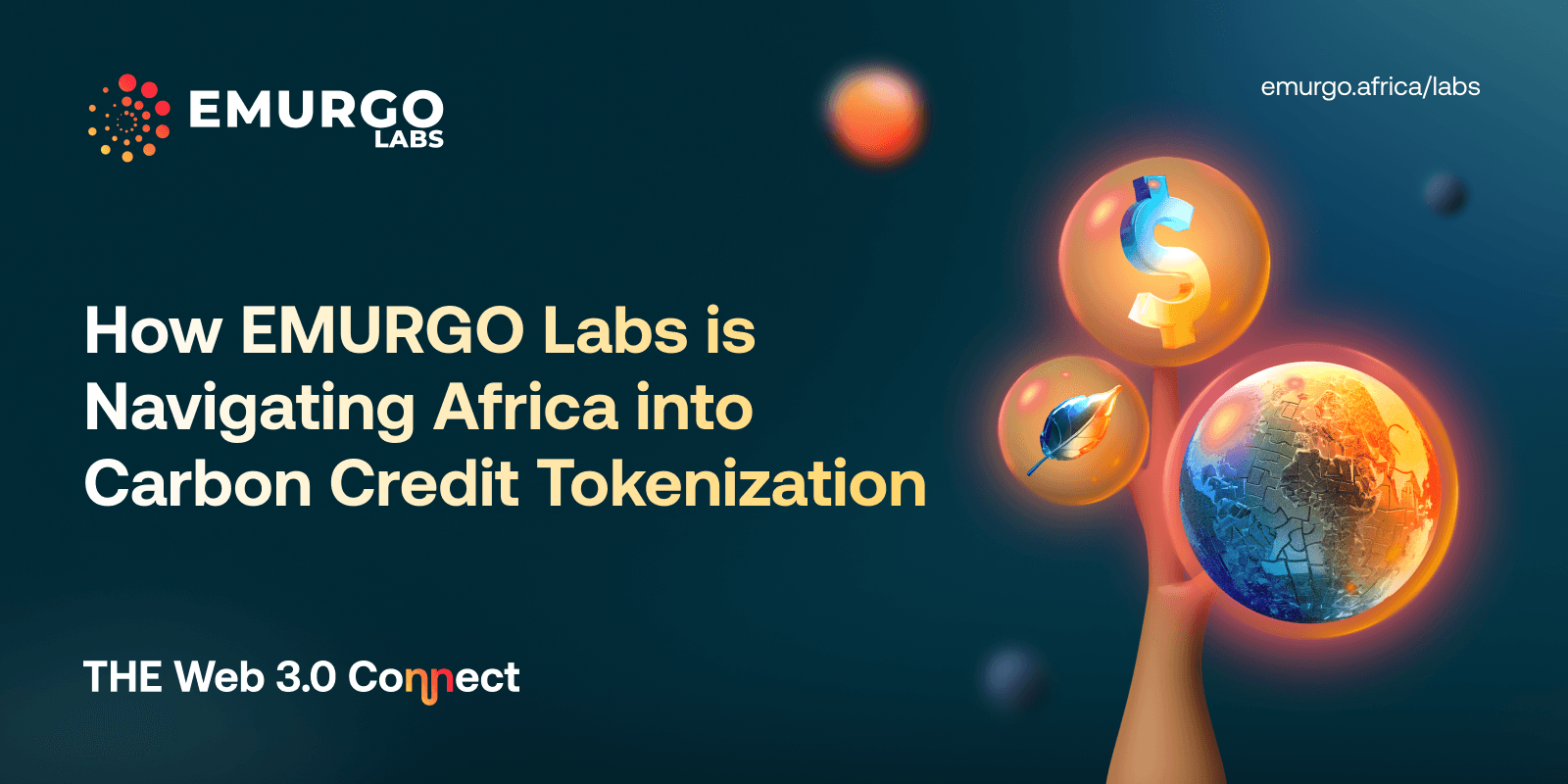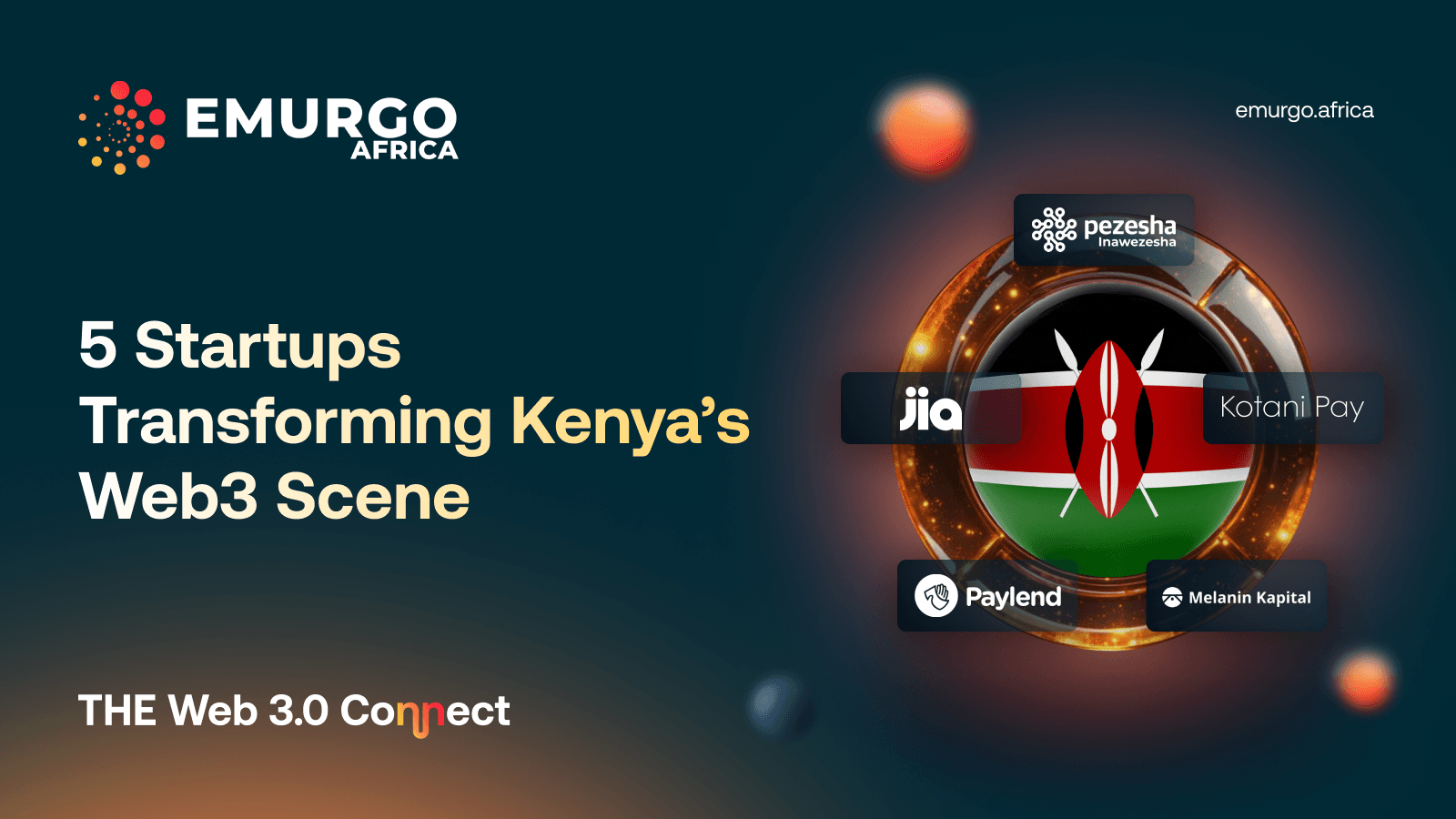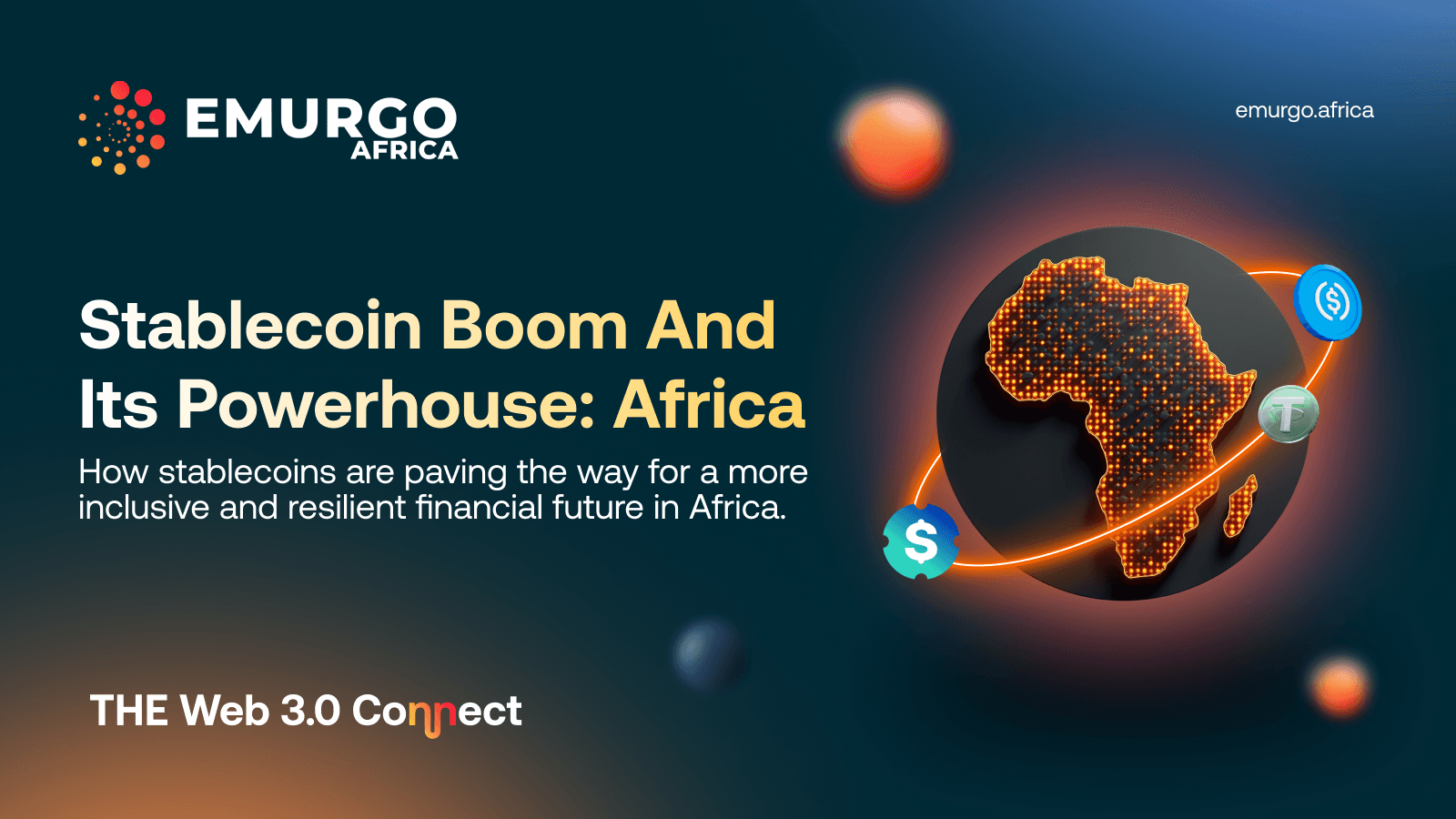By Ahmed Amer CEO, EMURGO Labs
Africa bears the brunt of climate change's devastating impacts despite contributing only 4% to the crisis, according to the Global Carbon Budget. However, the continent is not a passive victim of climate change. It is actively taking steps to adapt and mitigate its impacts by developing renewable energy sources, building resilience and participating in the global carbon credit export market.
The continent is witnessing a surge in climate-tech startups that tackle diverse aspects of the climate crisis. Based on current trends, there is strong evidence to suggest that Africa has the potential to become a major player in the global carbon credit market in 2024. For this edition, we are delving into London-based startup Changeblock that’s helping Africa solve the problem of low liquidity on carbon markets, lack of market standardization, complexity, price volatility, regulatory uncertainty, verification quality concerns and inability to access quality data.
Key Takeaways:
- Climate change-related startups are increasing in Africa.
- FOCUS: How Changeblock helps Africa grow its carbon credit market.
- CEO’s Vision: Creating liquidity in the carbon market using Changeblock.
- Big picture of Africa’s potential role as a big exporter of carbon credits.
- How EMURGO Labs is helping Changeblock tokenize carbon credits and grow its business.
- Climate-smart Startups are Gaining Momentum in Africa
Across Africa, a wave of ingenuity is rising to meet the challenges of our changing climate. Not through conventional means, but through a surge of vibrant climate-tech startups, tackling diverse aspects of the crisis with cutting-edge solutions. These ventures offer not just a shield against the storm, but the seeds of a resilient and sustainable future for the continent.
6 Key Areas Where Startups Address Climate Change in Africa
- Renewable Energy: Startups are developing small-sized solar, wind, and hydro power plants for off-grid communities to alleviate a chronic electricity shortage. For instance, SunCulture in Kenya and Ghana provides solar-powered irrigation systems for farmers. There is also a rise in electric vehicle usage and growth of e-bike startups in Africa.
- Carbon Credits and Climate Finance: Kenya, Zimbabwe, Tanzania, Uganda and Nigeria are among the African nations that have embarked on projects to protect and restore forests, generating carbon credits, while planning to give a part of the credit sales to local communities.
- Carbon Capture and Storage: Kenyan startups Climeworks and Octavia Carbon utilize DAC (Direct Air Capture) technology to directly capture carbon dioxide from the atmosphere using filters and chemical processes. The captured carbon dioxide can then be stored underground or utilized for various industrial applications. Carbon TerraFix (South Africa) focuses on mineralizing captured carbon dioxide through reactions with rocks, creating stable carbonate minerals for permanent storage.
- Climate-Smart Agriculture: Technologies like precision farming, drought-resistant crops, and digital platforms are aiding farmers in adapting to changing climates and enhancing food security. Zambia-based startup Zamgrow Farms, a hydroponics venture, provides a sustainable and water-efficient way to grow high-value crops, even in arid regions, offering income opportunities for peri-urban communities.
- Waste Management: Solutions for efficient waste collection, recycling, and upcycling are addressing pollution and creating circular economies. Waste Labs in Rwanda transforms plastic waste into construction materials, creating sustainable alternatives and tackling plastic pollution. Kenya’s Biochar Project converts agricultural waste into biochar (carbon-rich material), enhancing soil fertility, carbon sequestration, and crop yields.
- Early Warning Systems (EWS): AI-powered tools and sensor networks are being developed to predict weather events, floods, and droughts, enabling proactive disaster preparedness. SwiftAlert in Uganda provides mobile apps and SMS alerts to communicate real-time warnings and disaster preparedness information directly to communities, overcoming limited internet access. MeteoBLUE in Senegal, develops comprehensive EWS that integrate data on various hazards like floods, droughts, and storms. Akvo in Kenya Kenya utilizes sensor networks, drones, and AI to monitor weather patterns, predict floods, droughts, and landslides, and disseminate alerts to vulnerable communities.
STARTUP FOCUS: How Changeblock is Helping Africa Develop A Sustainable Carbon Market
Changeblock, a pioneer in environmental asset creation and exchange, aims to bridge the gap between sustainability initiatives and financial feasibility. Founded in early 2021 by Billy B. Richards and John Palmisano, it works like a green marketplace, connecting project developers who create environmental assets like carbon credits, sustainable fuels, and even responsible oil and gas projects with buyers looking to offset their emissions or invest in sustainability.
The London-based startup empowers project developers by providing a secure platform to list and trade verified environmental assets like carbon credits, sustainable fuels, and even oil and gas credits. This connects them with buyers seeking to offset their emissions or invest in green solutions, streamlining transactions and fostering transparency.
Co-Founder Billy Richards: From Oxford Biochemist to Blockchain Pioneer
Billy B. Richards, the CEO of Changeblock, is a computational and molecular biochemistry virtuoso from Oxford. He has transcended the lab to become a tech titan in the realm of blockchain and digital products. This three-time founder, armed with a blend of technical, commercial, and scientific acumen, steers Changeblock towards a groundbreaking future.
Beyond blockchain, Billy's expertise spans AI, legal tech, genetic diagnostics, and business consulting. He was Oxford's 2020 All Innovate winner, First Class Honors graduate, full scholarship recipient, and holder of the prestigious Titley and Moritz-Heyman Scholarships. A champion of climate finance and sustainable innovation, Billy's vision is to shape a better tomorrow for all.
What Challenge is Changeblock Solving? Billy Richards' Interview
Many environmental projects struggle to attract sufficient funding due to perceived risks and lack of clear revenue streams. Legacy trading mechanisms can be cumbersome and expensive, hindering market participation and increasing transaction costs for both buyers and sellers. “The carbon market is dominated by firms with significant market experience thus putting a very high entry barrier on small businesses and individuals. There are immense regulatory hurdles,” Richards says.
Traditional carbon credit creation often relies on manual processes and limited data analysis, leading to potential inaccuracies and a lack of trust in the market. Changeblock utilizes advanced analytics to convert project data into high-integrity, tradable credits, ensuring transparency and building trust between buyers and sellers.
“When you want to trade the credits or environmental assets, you have a massive liquidity issue. The transactions normally take two to three months. There is also a prevalence of misinformation because accurate data is not available,” he explains. “The cumulative impact is that you have a time intensive process for creating assets and very limited market access and participation.”
The environmental asset market, encompassing carbon credits, sustainable fuels, and other green commodities, is currently fragmented and opaque. Buyers and sellers struggle to find each other and lack transparent information about projects and credit quality.
Differing carbon credit verification and accounting standards across countries and regions can create market fragmentation and complicate cross-border transactions. Uncertainties about potential harmonization of these standards further complicate market operations and increase transaction costs.
“When it comes to trading, the problem gets even worse. There is a massive lack of market standardisations, there are lots of different standards, methodologies and verification processes in different jurisdictions. This creates unneeded complexity, price volatility and significant market risk exposure,” Richards expounds.
Frequent changes in regulations concerning carbon pricing, credit generation, and trading rules can make investors wary of long-term commitments in carbon credit projects. Uncertainties about future regulatory frameworks make it difficult for investors to assess the risks and potential returns of carbon credit investments, dampening enthusiasm.
Uneven or lax regulations can create loopholes for projects with questionable environmental benefits (greenwashing) to enter the market, undermining trust in carbon credits as a genuine climate solution.
“There is regulatory uncertainty globally, verification quality concerns and inability to access quality data. So no one trusts the market,” Richards notes. “Most of our supplies come from Africa. There is no consistency on pricing but one plastic credit goes for $100 per tonne, nature-based assets fetch less than $10 a tonne while concrete assets may go up four figures.”
How the Changeblock Platform Works
Built on the Cardano Blockchain protocol, the trading platform specializes in facilitating the exchange, settlement, and custody of environmental assets. Changeblock works with project developers to gather data, assess environmental impact, and tokenize verified credits. It utilizes advanced data analytics and modeling to validate the environmental impact of carbon mitigation projects, ensuring genuine credit generation.
The blockchain platform functions as a secure marketplace where buyers and sellers can trade these tokenized credits with confidence. All transactions are recorded and immutably stored on the blockchain, providing complete traceability and auditability, eliminating concerns about double counting or fraud.
Buyers can be confident they're purchasing genuine credits with verified impact, while sellers can ensure proper credit accounting and traceability. Tokenization and fractional ownership expand the pool of potential buyers and sellers, creating a more liquid and efficient market for carbon credits. This also allows for flexible purchase and trading.
Changeblock uses smart contracts to automate key aspects of the trading process. This eliminates paperwork, reduces transaction costs and minimizes fraud risks. By offering smart contracts and structured products, the startup makes it possible for large organizations to hedge their liabilities in the same way that other commodity traders do.
AI-powered risk management and real-time analytics provide crucial insights for trading decisions and support forward selling, thereby enhancing the depth of asset trading.
Changeblock offers different environmental assets: voluntary carbon credits, compliance carbon credits, tax credits, methane credits. The value of these assets accrues as the sector expands.
Changeblock monitors the global carbon market, considering the current and projected demand for different types of credits from various sectors. They also factor in the availability of similar credits in the market to ensure competitive pricing. They adapt their pricing methods to comply with evolving regulations and regional markets, taking into account carbon pricing policies and emerging regional carbon markets in Africa.
The value of these assets accrues improves especially if credits are bought on discount. As companies keep investing in the market, the value accrues overtime. On the secondary market built on Changeblock, users can stake their assets and benefit by the increasing prices of carbon credits. Eenrst & Young predicts the price of one carbon credit will go up from $20 in 2022 to $150 by 2035.
The Big Picture: Africa As a Potential Exporter of Carbon Credits
A carbon credit is a financial instrument that represents one ton of carbon dioxide removed from the atmosphere. Carbon credits are used in a trading mechanism called carbon offsetting, which allows entities to compensate for their greenhouse gas emissions.
The African continent sequesters vast quantities of carbon through its rainforests, peatlands, mangroves, grasslands and other habitats. The Congo Basin forest is the world's largest carbon sink, absorbing more carbon than the Amazon. It stores around 29 billion tons of carbon, which is equivalent to three years' worth of global greenhouse gas emissions. It also absorbs nearly 1.5 billion tons of carbon dioxide a year.
While efforts to monetise these nature-based carbon removal services are still very nascent, Africa's vast natural resources and unique challenges position it as a potential powerhouse in the global carbon credit market. Rising carbon prices, increasing market demand, and international support are bolstering Africa's position.
Touted as a game-changer at COP27, the UN-backed consortium African Carbon Market Initiative (ACMI) envisions a 19-fold increase in carbon credits by 2030, reaching a staggering 300 million credits annually. This translates to over 600,000 jobs and $600 million in yearly revenue for Kenya alone, AFP reported. But ACMI reckons that Africa uses just 2% of its annual carbon-credit potential. It projects that Africa could sell $100 billion worth of credits a year by 2050.
ACMI aims to unlock some $6 billion in revenue and create 30 million jobs in Africa by 2030 through carbon credits, and is already working with countries like Kenya, Nigeria, Malawi, Gabon, Togo, Mozambique, Rwanda and Burundi.
Currently, Africa accounts for 13% of global production of carbon credits, according to RippleNami Inc., a California-based data company. While the price of one carbon credit in Europe and the US ranges from $80 to $140, according to the agency, Democratic Republic of Congo president Felix Tshisekedi called for a carbon credit floor price of at least $100 per ton of carbon dioxide last year. The current average price is $5.
Africa’s renewable energy potential also positions it as the future carbon credit destination. Abundant sunshine, wind, and geothermal resources offer Africa the opportunity to transition away from fossil fuels, further reducing emissions.
African countries are also establishing and regulating their own carbon markets, creating frameworks for carbon credit transactions and attracting international investment.
Technological advancements in the form of carbon tokens on blockchain protocols, remote sensing and monitoring technologies are improving verification of carbon credits, making African projects more attractive to buyers.
How EMURGO Labs is helping Changeblock Tokenize Carbon Credits
EMURGO Labs, a blockchain solutions provider within the Cardano ecosystem, is playing a crucial role in aiding Changeblock's efforts to tokenize carbon credits.
Last August , EMURGO Africa, invested $250,000 in Changeblock to help the company revolutionize the carbon trading landscape by leveraging the power of blockchain technology.
“Together with ChangeBlock, we hope to bring the world’s regulators, business leaders, and global changemakers to foster and double down on their commitment to a global net zero strategy that is both economically viable and monetizable,” Ahmed M. Amer, CEO of EMURGO Labs said at the time.
EMURGO Labs leverages its expertise in blockchain technology to tokenize carbon credits onto the Cardano blockchain. This creates fractionalized digital representations of each credit, making them more easily divisible, tradable, and accessible to a wider investor base on the Changeblock platform. Tokenized carbon credits can be traded efficiently on decentralized exchanges (DEX), providing greater liquidity and faster transaction settlement compared to traditional carbon credit markets.
Changeblock leverages the Cardano blockchain, known for its security, scalability, and commitment to sustainability. The proof-of-stake consensus mechanism minimizes energy consumption while ensuring rapid transaction processing, ideal for high-volume carbon credit trading.
The startup also benefits from Cardano's robust smart contract capabilities which enable automated credit issuance, verification, and trade settlement. This reduces operational costs and increases market transparency. These contracts govern the issuance, transfer, and retirement of carbon credits in a secure and auditable manner.
DISCLAIMER_: The information in this content (website or other form) does not represent an offer or commitment to provide any product or service. The analysis, opinions and estimates expressed in this content are those of the respective authors, and may differ from those of EMURGO Africa and/or other EMURGO Africa employees and affiliates. Copying, re-publishing or using this material or any of its contents for any other purpose is strictly prohibited without prior written consent from EMURGO Africa._




